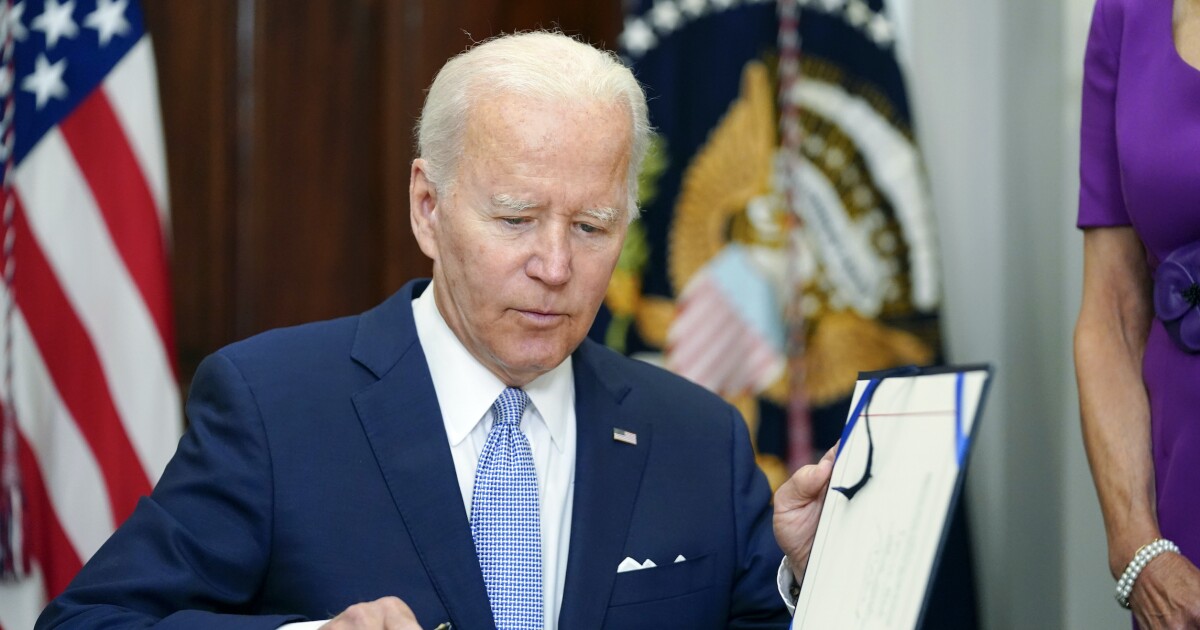

President Joe Biden could be close to issuing the first veto of his presidency as Republicans in Congress mount a campaign to challenge two Biden regulations and a bill to block a new crime law in the District of Columbia.
Lawmakers plan to utilize a congressional tool that rescinds recently finalized rules with a simple majority vote in both chambers and the signature of the president. The repeal of Washington’s crime law, meanwhile, also cannot be filibustered. With multiple Democrats facing tough reelection prospects in 2024, the GOP is poised to win enough support to send the measures to Biden’s desk.
The Republican-controlled House on Tuesday voted to undo a Biden administration rule that allows retirement plans to consider environmental, social, and corporate governance, or ESG, in their investment decisions. The Senate could take up the measure as soon as Wednesday.
The Republican joint resolution, which declares Biden’s rule “shall have no force or effect,” would ensure that plan managers only consider financial returns and not other factors like environmental pollution and employment policies.
NEARLY 50 SENATORS INTRODUCE CHALLENGE TO BIDEN ESG INVESTING RULE
Republicans consider the Biden rule part of what they describe as “woke capitalism,” while Democrats insist the regulation is agnostic and neither a requirement nor a recommendation.
“Retirement plans should be solely focused on delivering maximum returns, not advancing a political agenda,” said Rep. Andy Barr (KY), the Republican who introduced the resolution in the lower chamber.
Sen. Mike Braun (R-IN), who introduced the Senate version of the measure, is optimistic about its chances for passage.
“I think we could get a couple of votes that we weren’t expecting from Democrats, but we may not even need them,” he said on Tuesday.
The senator is advancing the resolution under the Congressional Review Act, which bypasses Senate rules requiring 60 senators to pass most legislation. Sen. Joe Manchin (D-WV) has already signed on as a supporter of the bill.
Ordinarily, Republicans would have to find one more Democrat to have enough votes, but with Sen. John Fetterman (D-PA) absent as he undergoes treatment for depression, Republican senators appear to have enough support to put the resolution up for a vote.
The Biden administration has warned that the president “will veto” the measure if it is sent to his desk.
“The President will continue to deliver for America’s workers. If the President were presented with H.J. Res. 30, he would veto it,” the White House said in a statement on Monday. “The rule reflects what successful marketplace investors already know — there is an extensive body of evidence that environmental, social, and governance factors that have material impacts on certain markets, industries, and companies.”
Sen. John Barrasso (R-WY) previewed how a Biden veto will be used against the president and Democrats at large.
“Joe Biden is giving the middle finger to middle-class Americans who are concerned about the return on their retirement funds,” Barrasso told reporters on Tuesday. “He is more committed to his climate change agenda and his pipe dream than he is the American dream from hundreds of millions of Americans.”
Next up in both chambers could be a CRA resolution on the Environmental Protection Agency and the Army Corps of Engineers’ “waters of the U.S.” regulation. Republicans have criticized the new rules, claiming they are overly restrictive for farmers and ranchers.
Republicans on Capitol Hill recognize the legislative push will likely fail once it reaches the White House but believe it can serve as an important messaging tool, especially ahead of the 2024 elections, and shows bipartisan agreement on GOP priorities.
“It’s not going to drive much policy because the president will veto anything he doesn’t like,” said Sen. Kevin Cramer (R-ND), speaking to reporters on Tuesday. “Of course, it’s political but it’s still important.”
Republicans are also moving closer to blocking changes to the District of Columbia’s criminal code that would reduce penalties on a variety of criminal offenses, including carjacking.
Since the District of Columbia is not a state, Congress is able to veto any law approved by Washington voters or the government. The new policy comes as crime in the district has increased, making it a ready-made fight for congressional Republicans who have been drawing attention to crime across the country as a political issue.
Vulnerable Democrats, fearing they will be labeled as soft on crime, may end up voting for the measure. Manchin become the first Democrat on Monday to join Republicans in agreeing to overturn the law.
Most Democrats, however, oppose striking down the Washington law, arguing local officials should be able to make their own laws free from congressional influence.
“We Senate Democrats care about D.C. political autonomy and also care a lot about the safety and security of D.C. residents,” Senate Majority Leader Chuck Schumer (D-NY) told reporters on Tuesday. “As you know, it’s a privileged motion, it could happen next week, and there will be a vote shortly thereafter.”
The White House has expressed its opposition to the bill, but the president has yet to issue a direct veto threat.
The dispute is a result of a decision by the D.C. Council to override the veto of Mayor Muriel Bowser (D). Despite her opposition to the bill, Bowser has said she opposes Congress overturning the law.
CLICK HERE TO READ MORE FROM THE WASHINGTON EXAMINER
In a letter last week, the D.C. Council defended the measure, writing that “the District of Columbia has the right to self-govern as granted to us under the Home Rule Act.”
“Any changes or amendments to the District’s local laws should be done by the elected representatives of the District of Columbia. As those representatives, we alone are accountable to the voters of the District of Columbia,” the letter said, adding, “Just as Congress does not interfere in the local matters of other states, we compel you not to interfere in our matters.”
Senate Republicans are aiming to hold a vote on the measure as early as next week.






